The Flyers were led in scoring that season by right winger Tim Kerr's 54 goals and 98 points, just ahead of Brian Propp with 43 goals and 96 points. Kerr was sixth in goals in the NHL that season, one back of Quebec's Michel Goulet and John Ogrodnick of Detroit who tied for fourth with 55 goals each.
The Flyers open the playoffs that season against the New York Rangers, who were paired in a best of five opening round series. Game 1 saw the Flyers jump out to a 3-0 first period lead at home at The Spectrum only to have the Rangers score two in the second period and tie the game at 3-3 with a goal 1:17 into the third period. Kerr then give the Flyers back the lead at 6:04. With victory in sight, Anders Hedberg tied the game with just 26 seconds remaining to send the game into overtime. After 8:01 of overtime, Mark Howe won the game from Grant Ledyard and Rick Tocchet.
Game 2 was tied at 1-1 after two periods before the Flyers pulled away with two goals in the third period win 3-1 and take a 2-0 series lead, putting the Rangers backs up against the wall.
Game 3 in Madison Square Garden was an offensive slugfest. New York drew first blood with a goal at 12:36 of the first period followed by a second power play goal at 16:41. Peter Zezel countered for Philadelphia with another power play goal 45 seconds later.
There were six goals scored in the second period alone, beginning with Doug Crossman's for the Flyers to tie the game at 6:25. Willie Huber put the Rangers back in front at 9:08 on the power play with Kerr in the box for Philadelphia for a 3-2 lead for New York.
With the Flyers now on the power play, Zezel, below the goal line in the right corner, fired a quick pass to Kerr who, left virtually unguarded, slammed the puck past Rangers goalie Glen Hanlon at 10:06. Kerr then struck again from Murray Craven at 14:58 to put the Flyers back on top 4-3 when he snapped a shot from the right faceoff circle past Hanlon.
Then, 1:44 later, Kerr completed his natural hat trick from Zezel and Howe with Philadelphia up a man on a play that was a mirror image of the first goal, with Zezel again feeding Kerr from below the goal line, only this time from the left corner, with Kerr converting the pass from the top of the goal crease on his backhand.
Kerr, however, was not finished as he then scored his fourth consecutive goal, and his third on the power play, at 18:22 when, trailing the play, he skated up the slot and took a feed from Zezel again and fired the puck past a shellshocked Hanlon. Zezel was credited with the first assist on goals 1, 3 and 4 during Kerr's outburst.
Kerr's four goals came within 8:16 of each other and set a record for Most Goals in One Period of a Playoff Game, Fastest Four Goals in a Playoff Game, Most Power Play Goals in a Period of a Playoff Game, and with the last three taking only 3:24, he also set a record for the Fastest Three Goals in a Playoff Game.
Kerr's four goals gave the Flyers a 6-3 lead going into the third period. Still not willing to go away quietly, the Rangers scored twice in the first four minutes of the third period against Philadelphia goaltender Pelle Lindbergh, who finished the game with 27 saves on 32 shots as Lindbergh and the Flyers held off New York for the final 16 minutes to complete the three game sweep and end the Rangers season.
In their next series against the New York Islanders, Kerr scored one goal in a 3-0 Flyers win in Game 1, added a second in Game 2, a 5-2 Philadelphia victory. He was held scoreless in a 5-3 Flyers win in Game 3. In Game 4 the Islanders staved off elimination by moving out to a 5-0 lead before Kerr scored twice late to make the final score 6-2 before the Flyers closed out the series with a 1-0 win in Game 5. By eliminating the Islanders, Philadelphia advanced to the Stanley Cup Finals to face the defending cup champion Edmonton Oilers.
Kerr scored once in the Flyers 4-1 opening game win and then again at the midpoint of Game 2 to tie the game at 1-1, but from then on the Oilers pulled away to win the game as well as the series to claim their second consecutive Stanley Cup. Kerr would lead the Flyers with 10 goals during the 1985 playoffs and was second in overall scoring with 14 points after Propp's 18.
Kerr played his junior hockey with the Kingston Canadiens of the Ontario Major Junior Hockey League from 1977-78 to 1979-80, a season during which he scored 40 goals and 73 points in 63 games. He was signed by the Flyers as an undrafted free agent. After playing seven games for the Maine Mariners of the AHL, Kerr began a 11 season run with the Flyers, highlighted by four consecutive 50 goal seasons from 1983-84 through 1986-87, scoring 54 the first two seasons and 58 the last two. His highest career point total came in 1984-85 when he added 44 assists to his 54 goals for a 98 point season.
A shoulder injury during the 1987 playoffs led to five surgeries over the next 14 months and cost him essentially the entire 1987-88 season, as he was only able to play 8 total games. He rebounded with a 48 goal, 88 point campaign the following year and then went on to score 14 goals and 25 points in 19 games of the 1989 playoffs. His return to the game after enduring the difficulties with his shoulder earned him the Bill Masterton Trophy for perseverance and dedication to hockey.
Kerr only played 40 games the following season and just 27 the season after that. He was left unprotected in the 1991 Expansion Draft and selected by the San Jose Sharks, who then traded him to the Rangers, where he managed 32 games in 1991-92. His career finished with 22 games with the Hartford Whalers in 1992-93 before he retired with 370 goals and 674 points in 655 games, leading the Flyers in scoring in 1983-84, 1984-85, 1986-87 and during his rebound season of 1988-89. At the time of his retirement, Kerr was 10th all-time in goals per game.
His outstanding game on this date in 1985 when he scored four goals during the second period set four separate records:
- Most Goals in a Period in a Playoff Game with 4
- Fastest Four Goals in a Playoff Game at 8:16
- Most Power Play Goals in a Period in a Playoff Game with 3
- Fastest Three Goals in a Playoff Game at 3:24
Today's featured jersey is a 1984-85 Philadelphia Flyers Tim Kerr jersey as worn when Kerr four league records during his four goal outburst during the second period of the Flyers playoff game on this date in 1985.
The Flyers had worn essentially the same jersey since their inception in 1967-68, with stripes that run down the arms until the wrap around the arms when they reach the black cuffs. Over time the numbers changed from one color to two, names were added to the back and black trim separated the body color from the shoulder/sleeve stripe starting in 1982-83 and the design received its final adjustments in 1983-84. A black alternate of the same design arrived in 1997-98 and became the primary road jersey in 2001-02 when the orange jersey was retired. The white and black jerseys would continue through the 2006-07 season until the introduction of the Reebok Edge jerseys brought their long run to an end.
The Flyers brought back an early version of today's orange jersey in 2008-09 as a throwback styled third jersey and made a white version for their appearance in the 2010 NHL Winter Classic and then made the white jersey their full time road jersey and their throwback orange alternate their new home jersey for the 2010-11 season and have worn them since.
In today's video section, Kerr's four goals in 8:16 of the second period of the Flyers playoff game against the Rangers on this date in 1985.

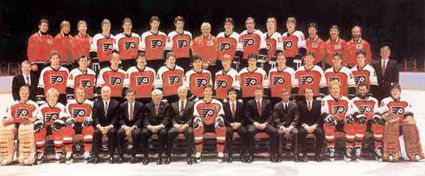
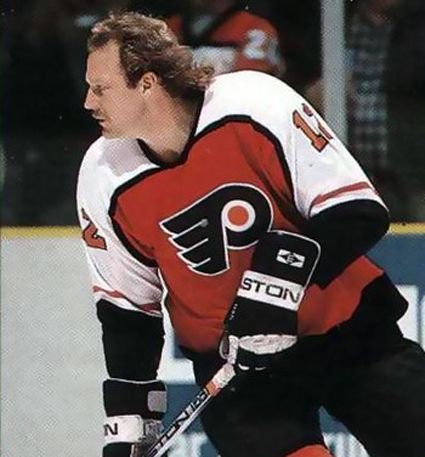
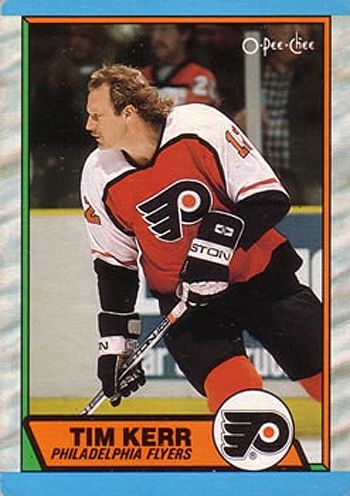
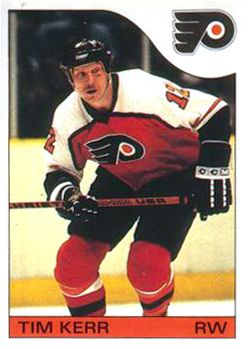
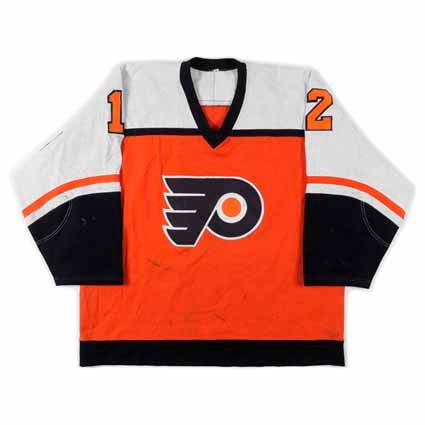
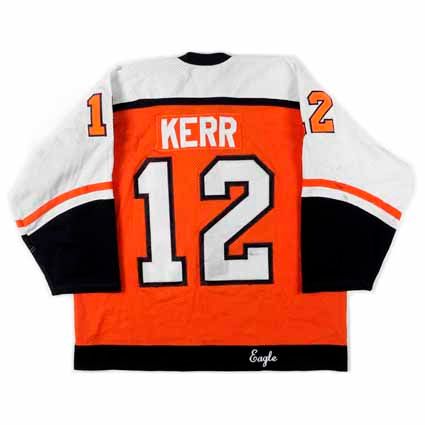










No comments:
Post a Comment
We welcome and encourage genuine comments and corrections from our readers. Please no spam. It will not be approved and never seen.